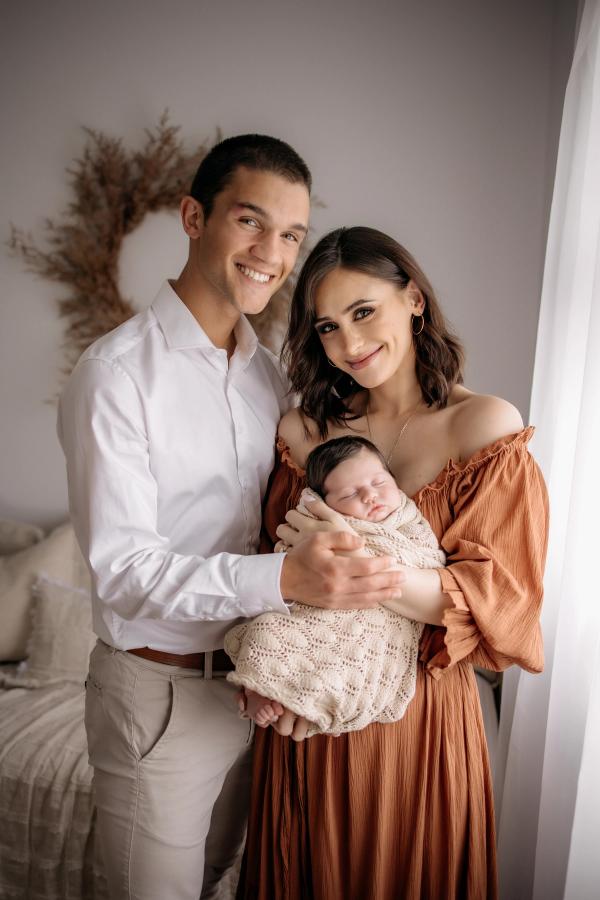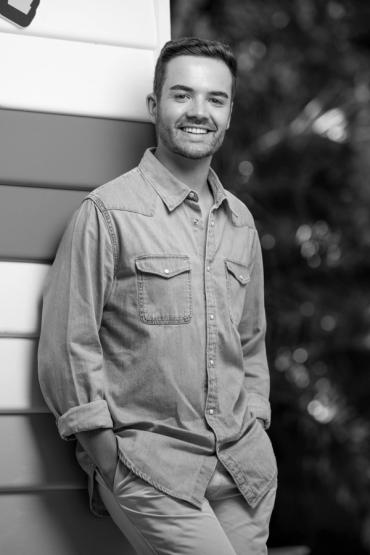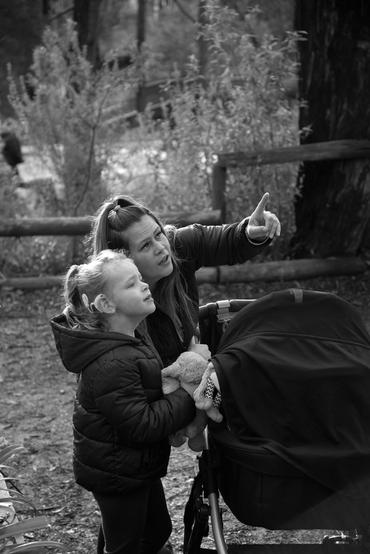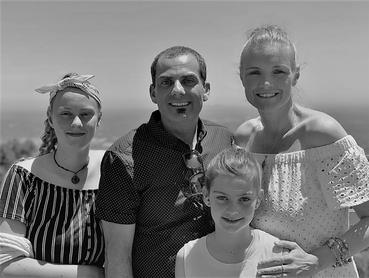My story, my career path - Jamie Hannah Lane
Jamie works as an employment consultant with Sign For Work at Deaf Children Australia. Jamie shares her experience growing up to inspire the new generation of deaf or hard of hearing young people to achieve their goals.

Everyone is uniquely their own person, and having a hearing impairment should not lessen that worth.
What do you recall about your diagnosis?
I was not diagnosed until I was almost 3 years old – my parents did not notice it and thought I was a quiet child, in my own world. Funny, looking back at home videos, you can see at birthday parties or if someone was calling out to me, I did not respond to sounds. We never knew if I was hearing impaired from birth because I was a premature baby, or if it happened later.
I think my parents took this as quite a shock and were not sure what my upbringing was going to be like, and how they were going to raise me. Fortunately, they received a lot of assistance, and they did the best job they could supporting me, which I thank them for to this day. They made sure I went to a kinder, primary, and high school with teacher aides for hearing impaired students, and regularly took me to my audiologist appointments. They loved me for who I was and treated me as their own, seeing beyond my disability.

David (Jamie’s Dad) – I remember that Jamie’s Mum and I were relieved and confused at the same time. Relieved that was the reason speech development seemed delayed and confused as neither of us had ever known anyone with a hearing impairment. This opened us up to a whole new world of understanding and learning how to best communicate with Jamie. Also, what options and paths we would need to take to give her the best possible future.
If and what age were you fitted with a hearing aid or cochlear implant and what was that like?
I was fitted with hearing aids in both ears at 3 years old, I do not remember because I was so young, but I could imagine at the time hearing all the sounds that I have never heard before, having one of my senses given back to me and to be able experience that.
David (Jamie’s Dad) – I cannot say enough good things about everyone that works in the hearing impaired and Deaf Community. All the help and support for all of us was fantastic. Once Jamie was fitted with hearing aids and we were working with Teachers of the Deaf in kinder and school, development with speech and communication improved dramatically.
Are you oral and if so, what was your experience like learning spoken language?
I speak orally but was quite delayed with my speech and communication until I was fitted with hearing aids. It changed and improved rapidly, and I managed well, my parents had me work with a speech therapist to help in the early years.
Do you use Auslan, why did you decide to learn and at what age?
Unfortunately, I did not learn Auslan. However, I wish I could’ve because it would connect me to others in the Deaf Community. Although, I am excited and keen to learn it now.
How did you communicate within your family and amongst friends?
I spoke with my family and friends through verbal communication, and from an early age, I have always been a lip reader, which is quite handy in super noisy environments if I cannot hear people, but I can read lip, which has always been a cool skill to have. (To be a secret agent, haha)
Tell us about going to school - what was that like? What were the worries you had that you remember?
I went to a mainstream primary and high school, and I was quite fortunate that they had a facility there to support children with hearing impairments. Primary and high school were very different experiences. As a younger child, I was more carefree and happier, and it did not really bother me that I was hard of hearing. Having the support of my parents, my family and teachers helped my confidence to grow. Also, when I attended kinder, there was support for hearing-impaired children as well, so I felt included from an early age. I was also lucky to have a best friend who was also hearing impaired from kinder, and we went to the same primary school. We had each other’s back the older we got.
Unfortunately, I did become a target to bullies for “being different,” and my confidence was shattered. I questioned everything....I realised that if people had a problem with it, it was not me – it was them. And that is when I began to accept and love myself.
When high school came around, it was very different from primary school. Unfortunately, I did become a target to bullies for “being different,” and my confidence was shattered. I questioned everything. No one was aware or educated about the hearing impairments or the deaf community, and I felt very self-conscious as a result. I did not want to talk or attract anyone to my “deaf accent,” I always had to wear my hair down because I did not want people to see my hearing aid. I made it a mission to make sure no one knew I was hearing impaired, just to fit in but it was very exhausting and lonely. I had a breakdown when people found out, because I would fear to be seen as different. More bullies, pulling out my hearing aids, mocking my “accent,” yelling at me, and asking if I could hear them, intentionally leaving me out of conversations. Kids could be so horrible. I was lucky to find some beautiful friends to accept and support me, but high school was tough time for me, and I could not wait to leave. I felt because there was not enough awareness or education about the hearing impairment or deaf community, other disabilities, mental health awareness, etc. not only myself but others struggled as well.
When I finished year 12, I felt such a relief off my shoulders, leaving all that behind and starting fresh.
I knew I had a lot of self-work to do to learn to love me for who I am, and being hearing impaired is not my identity. It is a part of me, and I am me, having a hearing impairment was beyond my control and I learnt to love that part of me.
I realised that if people had a problem with it, it was not me – it was them.
And that is when I began to accept and love myself.
And tell us about going to Uni or TAFE - what was that like?
I went to Victoria University, and I really enjoyed it – I was passionate about what I was studying. I always studied before each class what we were learning so I was prepared, I knew I learnt best been at the front of the class, so I could absorb the information, and if I missed anything, I would check with the teachers. It was different to high school. I took ownership and was proud to be hearing impaired. I did not hide it from anyone, and everyone was super friendly, kind, and genuine – I loved my teachers and my classmates, I wholesomely belonged.
From the bottom of my heart, be kind and patient with your deaf/hard of hearing child, and with yourselves.
What influenced your career choices?
I knew I always had a creative part of me from when I was a little girl – I loved writing, art, makeup, photography, film, etc.
In year 12, I had a media assessment that I was so passionate about, my message was what if mental health were shown on the outside, would we be more kind and understanding? I picked 16 different mental health issues to portray with art and makeup, and I had 16 different models, to create each different one.
Prior this, I spent a lot of time doing face charts, researching different mental health issues and how I would be able to create and symbolise these. I randomly got a bunch of my makeup, one of my cousins, my school’s drama makeup kit, bought some art stuff and props. I set my living room as a studio, using whiteboard as a backdrop. I made it a mission to make this assessment idea come to life, and in the process of doing all this, is when I found my passion for makeup and photography.
The year after, I enrolled into a specialist makeup degree. It was an expression of me. It occurred to me that what I could not say verbally I could communicate when I had the colours and brush in my hand, I would create. I ended up doing freelance and working with a makeup brand for a few years, which I loved doing. The other part of it that I loved was seeing the clients face afterwards, the boost of confidence they feel in themselves. It was rewarding for me to be able to do that for them. But I wanted more – I yearn for opportunities when the purpose was to help people.
So I went back to my primary school, to do a volunteer camp support with the hearing impairment students. It really felt right to be there, I wish I had older people like me around at the time to tell me everything was going to be okay and that I am okay the way I am. Everyone is uniquely their own person, and having a hearing impairment should not lessen that worth.
A year and a half later, I started my career here working for Sign for Work, at Deaf Children Australia, and to this day, I am profoundly grateful to be working where I am. My team are authentic, beautiful, and kind; I feel like I belong, and I am where I am meant to be. I love what I do. To be helping people, not only to find their career pathway, but to find themselves.
What are your main challenges?
Hearing fatigue is a big one for me. I believe with a hearing impairment, I have to work twice as hard to focus, lipread, and listen, and I can get quite tired from this.
Struggling to hear people or missing information.
Running out of batteries quickly.
Sometimes, I can still get taken back by people’s negative reactions, response or comments towards my hearing impairment or accent, and it still hurts.

How have you learned to manage those challenges?
I just take extra self-care of myself, making sure I have had enough rest and time to fill my cup with things I enjoy – yoga, listening to light-hearted music, walking, be in nature surrounding like the beach, journalling, reading, and just having quiet time to allow my mind and energy to rejuvenate.
If I have not been able to hear someone properly or miss information, I just take ownership in that and ask for the information to be repeated. Thankfully, I have lip reading to allow me to know what the person is saying in a noisy environment.
Always having stock of lots of batteries on me ha-ha – my pocket, my wallet, my car, my grandparents' house, everywhere.
And just simply accepting that if someone is judgemental towards my hearing or accent, that is not my fault or anything to do with me– that is them.
What key message would you give parents who are starting out their journey with a deaf/hard of hearing child?
From the bottom of my heart, be kind and patient with your deaf/hard of hearing child, and with yourselves.
Affirm your kids/children always, be there for them, and remember you are both doing the best you can. Having a hearing impairment is beyond both your control, and it also can be a beautiful journey.
To see beyond is what really matters. Love. Authenticity. Support.



